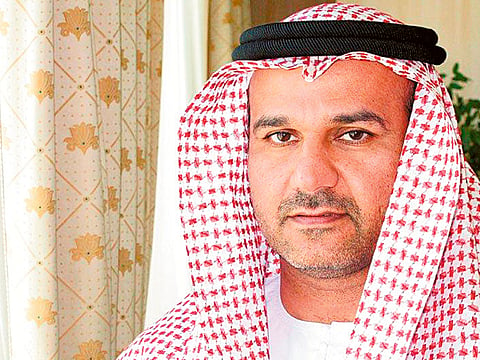Abu Dhabi Aviation looks to drone technology
Company looks to sign partnerships at IDEX

Abu Dhabi: Abu Dhabi Aviation, a commercial helicopter operator, is looking into new technology including drones and pilotless aircrafts in order to expand the business, according to the company’s chairman, Nader Al Hammadi.
“I think as a helicopter operator with all this experience, you cannot see things pass by and do nothing, so I think there should be a starting point. With all the interest that drones and unmanned aircraft are getting, it’s probably the time for Abu Dhabi Aviation to think about the role they will play in the future,” Al Hammadi said.
In an interview with Gulf News, the chairman said that the interest generated by different government entities for drones is pushing the company to consider starting working on them.
Abu Dhabi Aviation is yet to look into partnerships with other companies in order to develop drones or operate unmanned aircrafts.
Al Hammadi said the company will use its participation in the International Defence Exhibition and Conference (Idex) to cooperate with other entities on that.
Idex is set to run for five days in Abu Dhabi starting February 22.
“We don’t want to reinvent the wheel, but we will start from somewhere. During Idex, we will be looking into the technology, the application of it, and if we could do a partnership with someone,” he said.
While Al Hammadi did not set a timeline, he said it would depend on the company that Abu Dhabi Aviation will partner with, but work is expected to start as soon as both parties sign an agreement.
“Hopefully, before the end of 2015 we would have something … and I think once you start working on one, you have to also work on the other (drones and unmanned aircrafts).
I don’t think technology is the barrier; I think regulation is because it depends on how you regulate all those drones being flown safely and without any interference,” he said.
Though the chairman said drones could become more mainstream in the near future, he said unmanned aircrafts used for commercial purposes could take longer in order to change people’s mindsets.
“Although there’s so much technology on the ground, it will not be put on the airplane until it has a proven track record. The technology will be utilised by the military for years before it finds its way in the civilian sector, so I think it will take time. Even it gets done in the future, it will be on a smaller geographical location,” Al Hammadi said.
Drones have been the centre of controversy recently as they raise questions on air safety as well as violation of privacy and personal property.
Aircraft Fleet
Asked about plans to grow Abu Dhabi Aviation’s fleet, Al Hammadi said it would depend on consumer demand for private jets, and that such demand has not been affected by falling oil prices.
“Because of the diversified business that we have, we have different products for different clients, so this portfolio does not make us very volatile to changes in supply and demand,” he said.
The chairman said that Royal Jet, which is jointly owned by Abu Dhabi Aviation and the Presidential Flight Authority, is looking to expand its fleet following its latest addition of Bombardier Global 5000. He declined to disclose further details, saying that announcements will be made by Royal Jet.
Oil Prices
Discussing oil prices, he added that he did not expect prices to fall further as they have already bottomed-out. Being a supplier of private jets to high-end clients, Al Hammadi said the business is not impacted by oil prices as clients bear the cost of oil.
Abu Dhabi Aviation is also not in price-hedging deals, meaning that the company is benefiting from low prices. This is not expected to have a strong impact on revenues and costs, though.
Maximus Air
Al Hammadi also talked about Maximum Air, in which Abu Dhabi Aviation owns 95 per cent of shares, saying that there have been corrections to account for last year’s losses.
“The cargo market in the last two years did not grow as we were expected. Two aircrafts have left, and starting this year, the company has started re-profitability and growth. We expect this profitability to continue,” he said.



